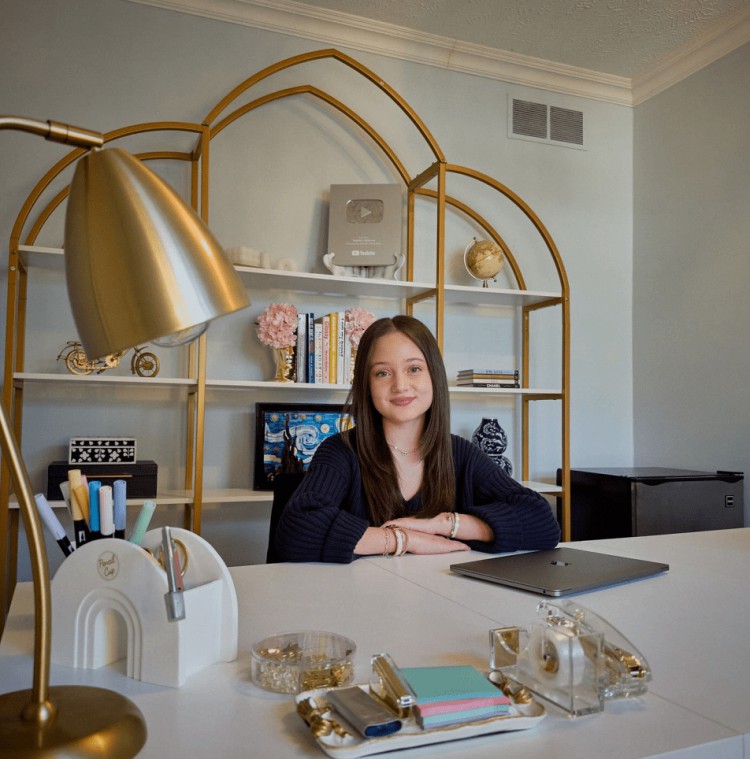Meta Era news,
Original title: These Teenagers Know More About Investing Than You Do
Original author: Hannah Miao, Gunjan Banerji, The Wall Street Journal
Not only does 17-year-old Sophia Castiblanco drive a Tesla, she owns a stake in the company.
Sophia, a high school junior in suburban Chicago, has invested in stocks in companies such as Tesla, Apple (AAPL) and Amazon.com (AMZN). When she started making money as a social media content creator three years ago, her parents encouraged her to invest some of her income in investments that could grow in value over time, rather than stashing all her cash in a savings account.
Her father helped her open accounts at Charles Schwab, Edward Jones and Robinhood, and she has now invested thousands of dollars. Last year, she saved up to buy a new Tesla Model 3 (price starts at about $40,000), and her parents shared the repayment plan with her. She creates videos on TikTok, Instagram and YouTube, teaching the basics of investing to her thousands of followers.
"I have always had a business mindset of wanting to make money, and I don't mind taking risks," Sophia said. "Actually, no matter how young you are, you can start investing."

Sofia Castiblanco invested the money she earned from creating social media content.
Sophia is one of many teenagers taking a plunge into the U.S. stock market. Teenagers typically have to wait until they are 18 to open their own brokerage account, but adults can open custodial accounts for minors. These accounts are handed over to the children when they reach legal age.
According to Schwab, the company's total number of youth custodial accounts will reach nearly 200,000 in 2022, up significantly from 120,000 in 2019. In 2023, that number topped 300,000, thanks in part to Schwab's integration of TD Ameritrade. Other brokerage firms including Vanguard, Fidelity and Morgan Stanley's E*Trade have also reported a surge in the number of managed accounts in recent years.
Some teens ask their parents to open accounts with brokerages like Robinhood that don't offer custodial accounts, and then share login information. On smaller financial apps like Greenlight, teens are investing more money than ever before. In 2023, they invested $20 million through Greenlight's app, up from about $10 million in 2021.

A recent Fidelity study on teens' relationship with money estimated that about a quarter of U.S. teens have begun investing, based on an online survey of 2,081 respondents ages 13 to 17. The number of transactions made using Fidelity's Youth app, accounts owned by teenagers but opened by their parents, jumped in the fourth quarter.
Kelly Lannan, a senior vice president at Fidelity, said many teens opened accounts while away from school over the winter break.
This teenage investment boom is part of a larger trend that has seen Americans flood into financial markets since the onset of the coronavirus pandemic. The stock market is riding high, attracting a large number of novice investors trying to profit from the surge.
Many new investors later abandoned the meme stocks that soared during that period but continued to invest, pushing the share of Americans who own stocks to a record high.
Stocks are back at record highs, with the Dow Jones Industrial Average recently topping 38,000 and the S&P 500 topping 5,000 for the first time. Novice investors launched an unprecedented trading frenzy in early 2020, and the S&P 500 has soared around 55% since then.
“More and more people are realizing that the earlier they start investing, the better,” said James Martielli, director of investing and trading services at Vanguard.
Mattelli said he opened escrow accounts for his three children more than a decade ago when they were toddlers. At Vanguard, the number of custodial IRAs, a type of retirement account, has been growing rapidly.

The biggest advantage is time. According to calculations by the investing app Stash, which offers custodial accounts, if you invest $10 a week starting from the time your child is born, assuming an annual return of 8%, your child will have $100,000 by the time he or she turns 18. Reserves of approximately $20,000. By the time the investor reaches age 70, that sum will jump to about $1 million, assuming an annual return of 8%.
Of course, these returns can be affected by a variety of factors, including when investors buy and how the stock ultimately performs. The S&P 500's annualized total return over the past three decades has been about 10%, according to data from Dow Jones Market Data through the end of 2023. If you bought an S&P 500 index fund at the highs of the dot-com bubble in 2000, it would have produced an annualized total return of about 7%; if you bought it at the lows of the financial crisis in 2009, it would have produced about 16% annualized total return.
Executives at popular technology stock brokerage firms said technology giants that are ubiquitous in teenagers' lives tend to be the stocks held most by this group. At Vanguard, U.S. stock index funds are especially popular for managed accounts.
Mahanth Komuravelli, 16, holds about $7,000 in a portfolio, a small portion of which is in an S&P 500 index fund and the bulk of which is in Amazon and Advanced Micro Devices, or AMD. stocks of large companies. He's considering buying some small-cap stocks, such as education company Chegg. Mahans used a Fidelity Youth account his father helped him open. Father and son often exchange investment ideas.
"Sometimes he would come to me for advice," Mahans said. He is a high school junior in Edison, New Jersey.
Kaida Benes, a 13-year-old girl from suburban Minneapolis who earns money from household chores like washing dishes or cleaning bathrooms, has been putting the money into an investment account at Greenlight that now has $1,000 in it About.
She's also been attracted to big companies, investing in Apple, Alphabet and streaming companies like Disney and Netflix. Sometimes she gets nervous about possible losses. With her mother's help, she said, she learned to live with the fluctuations.
Talking about what he learned, Keda said: "Stocks go up and down. It doesn't matter, this is normal."
She is always looking for other opportunities to make money that she can put into a savings account or invest. Keda and her mother, Renee Benes, said she recently found a recliner at a neighborhood flea market and asked her parents to help repair and renovate it before putting it up for sale on Facebook Marketplace for a profit.
"I like the feeling of being rich," Keda said.
Renee Benes said she was upset that she didn't start learning about investing until a year or two ago, when she was in her 30s. Benes is a popular blogger. She hopes that her son and daughter will be better at managing money.
lessons learned
Many younger investors are starting to invest earlier than previous generations. Nearly two-thirds of Gen Z investors say they began learning about investing as early as high school or middle school, compared with 1,000 in a 2023 Bank of America survey of wealthy individuals. The proportion for Millennials is about 38%. Some people are introduced to stocks through family members or teachers, while others learn about them from social media.
Felix Peng, a 17-year-old boy from the Los Angeles area, said he learned a lot about investing from YouTube and Instagram, but some social media stars recommended riskier trading strategies that seemed More like gambling. He said it's a red flag when influencers try to sell expensive trading courses and promise investors they'll make a lot of money quickly.

Still, Felix believes that young people don't have as much money to lose and it would be beneficial for them to learn from their mistakes at this time. His investments in Apple, Meta Platforms and Alphabet have all performed well. But he learned how difficult it is to time the market when he bought Teladoc shares at their highs and watched them plummet. He has about $1,000 in a custodial account with Stockpile, an investing app for parents and kids.
"It was a good lesson and I'm glad I learned something," Felix said.
Felix Peng said he learned how difficult it is to time the market.
Rachael Kim, 17, is from Orange County, California. She said she traded AMC Entertainment Holdings stock during the meme stock era and made about a 300% profit.
“For a while, I became addicted to this adrenaline rush,” Rachel said of day trading. "But as I started doing more research, I realized that these huge profits were unlikely to continue."
Rachel said she started learning about investing to help her immigrant parents prepare for retirement. Now, she regularly invests about half of her income in S&P 500 Index Funds and Nasdaq 100 Technology Sector Index Funds, which she earns from social media content creation, working as a cashier, and teaching at a church. She has about $10,000 in a Roth IRA custodial account at Fidelity.
“Because we’re young, we’re lucky enough to see our investment grow,” Rachel said. "The biggest lesson is to start investing early."
Original link
